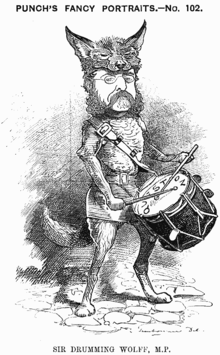Henry Drummond Wolff

Sir Henry Drummond-Wolff GCB, GCMG, PC (1830 – 11 October 1908) was an English diplomat and Conservative Party politician, who started as a clerk in the Foreign Office.[1]
Background
Wolff was the son of Georgiana Mary (née Walpole) and Joseph Wolff.[2][3] His father was a missionary who had been born Jewish, and his mother a descendant of Prime Minister Robert Walpole.
Political and diplomatic career
Drummond Wolff sat in parliament for Christchurch from 1874 to 1880 and for Portsmouth from 1880 to 1885. Whilst MP for Christchurch he lived in Boscombe, where he developed the Boscombe Spa estate, and he played an active role in the public life of Bournemouth. In 1870 presented the Bournemouth Rowing Club with a four oared racing galley. He was one of the group known as the Fourth Party.
In 1885 he went on a special mission to Constantinople and Egypt in connection with the Eastern Question,[4] and as a result various awkward difficulties, hinging on the Sultan's suzerainty, were addressed. Wolff negotiated a settlement whereby Britain and Turkey would each appoint a commissioner to Egypt to help the khedive's government conduct reforms of the army and the government. Wolff then assumed the role of British high commissioner in Egypt from 1885[5] to 1887. He was appointed Envoy Extraordinary and Minister Plenipotentiary to Teheran in 1888, a post he held until 1891, and was then Ambassador to Madrid from 1892 to 1900.
Drummond Wolff was a notable raconteur, and he did good service to the Conservative Party by helping to found the Primrose League. He was appointed a Knight Commander of the Order of St Michael and St George (KCMG) in 1862 for various services abroad. He was advanced to Knight Grand Cross of the Order of St Michael and St George (GCMG) in 1878 and made a Knight Grand Cross of the Order of the Bath (GCB) in 1889.
Family
Drummond Wolff's only daughter, Lucas Cleeve, was a novelist.[6] His grandson, Henry Maxence Cavendish Drummond Wolff, was briefly the Conservative Member of Parliament for Basingstoke.
Notes
- ↑ Biography of Joseph Woolf at the Jewish Encyclopedia
- ↑ http://www.cwi.org.uk/library/articles/HATA.html
- ↑ http://www.thepeerage.com/p3833.htm#i38326
- ↑ The London Gazette: no. 25502. p. 3848. 18 August 1885.
- ↑ The London Gazette: no. 25528. p. 5129. 10 November 1885.
- ↑ Lorna Sage, Germaine Greer, Elaine Showalter (1999). "Cleeve, Lucas". The Cambridge guide to women's writing in English. Cambridge University Press. ISBN 978-0-521-66813-2.
References
 This article incorporates text from a publication now in the public domain: Chisholm, Hugh, ed. (1911). Encyclopædia Britannica (11th ed.). Cambridge University Press
This article incorporates text from a publication now in the public domain: Chisholm, Hugh, ed. (1911). Encyclopædia Britannica (11th ed.). Cambridge University Press
External links
| Wikimedia Commons has media related to Henry Drummond-Wolff. |
-
 Works written by or about Henry Drummond Wolff at Wikisource
Works written by or about Henry Drummond Wolff at Wikisource - Hansard 1803–2005: contributions in Parliament by Sir Henry Drummond Wolff
- Sir Henry Drummond Wolff (1908). Rambling Recollections. Macmillan and co., limited.
- Henry Drummond Wolff (1892). Some Notes of the Past. W. Clowes and Sons, Limited] Printed for private circulation.
| Parliament of the United Kingdom | ||
|---|---|---|
| Preceded by Edmund Haviland-Burke |
Member of Parliament for Christchurch 1874 – 1880 |
Succeeded by Horace Davey |
| Preceded by Thomas Charles Bruce Sir James Dalrymple-Horn-Elphinstone, Bt |
Member of Parliament for Portsmouth 1880 – 1885 With: Thomas Charles Bruce |
Succeeded by Sir William Crossman Philip Vanderbyl |
| Diplomatic posts | ||
| Preceded by – |
High Commissioner to Egypt 1885–1887 |
Succeeded by – |
| Preceded by Ronald Ferguson Thomson |
Envoy Extraordinary and Minister Plenipotentiary 1888–1891 |
Succeeded by Sir Frank Lascelles |
| Preceded by Sir Clare Ford |
Ambassador to Spain 1892–1900 |
Succeeded by Sir Mortimer Durand |
|